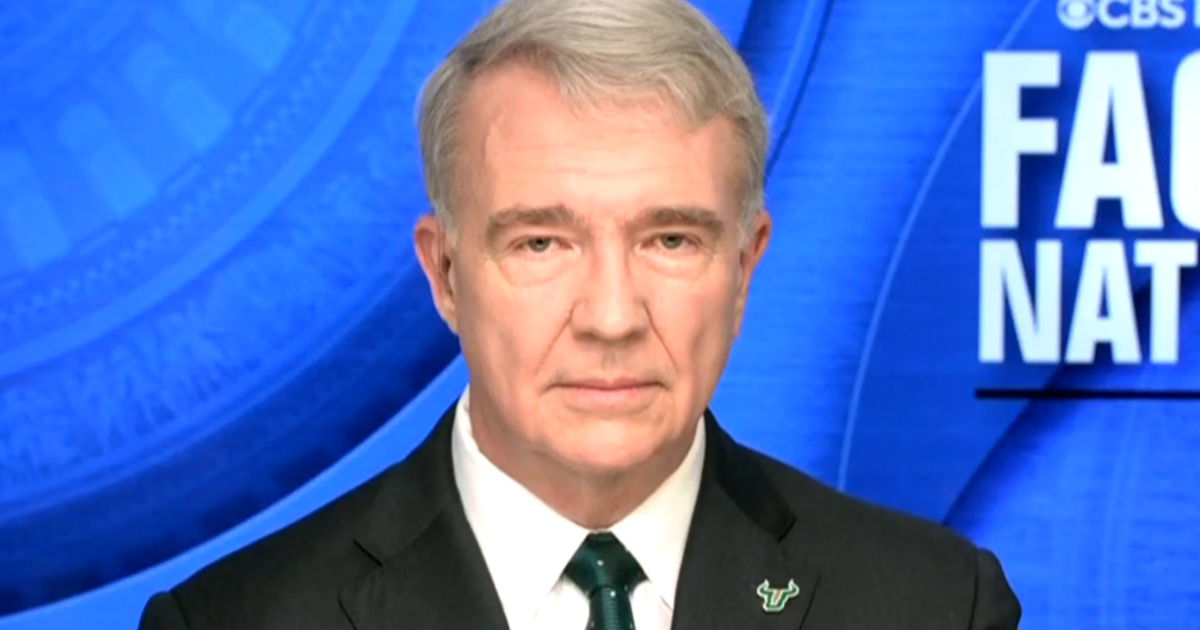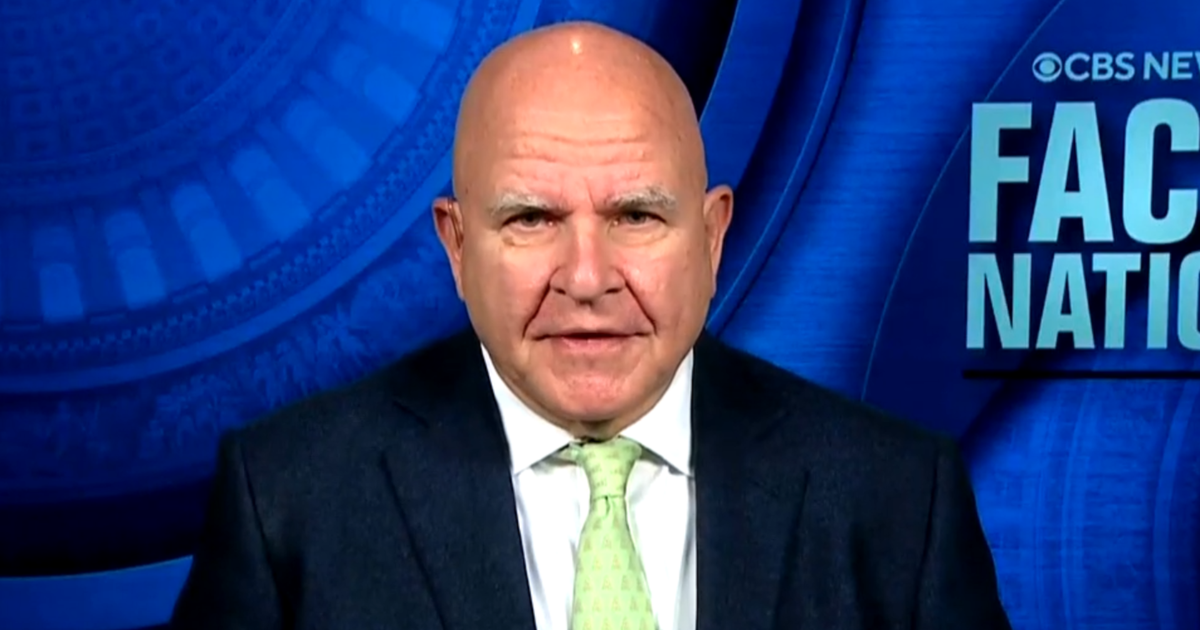CBS News
Transcript: Ret. Gen. Frank McKenzie on “Face the Nation,” Feb. 4, 2024

The following is a transcript of an interview with retired Gen. Frank McKenzie, former chief of U.S. Central Command, that aired on Feb. 4, 2024.
MARGARET BRENNAN: For some analysis on the situation in the Middle East, we turn now to the former head of U.S. Central Command, General Frank McKenzie. He was in charge of U.S. forces in the Middle East for three years under the Trump and Biden administrations. Welcome back.
GEN. FRANK MCKENZIE: Good to be here, Margaret.
MARGARET BRENNAN: General, how would you assess the impact of the strikes so far, which you just heard National Security Advisor Sullivan say is just the beginning?
GEN. MCKENZIE: I- I think that’s pretty accurate. I don’t think we know yet. I think it’s going to require more work. And I think we do need to have an understanding of what we want as an end state. For- for me as the operational commander, back when I was in command, it would be that they cease attacks on our bases and- and operating positions in Iraq and Syria. That’s a pretty clear end state. You know, the problem is, there’s a lot of talk about Ira- Iran actually not giving the order for this specific attack. And there’s some truth to that, because around 2020, Iran began to give blanket clearance to these groups to attack United States positions in Iraq and Syria. So they now operate under a- a sort of procedure where there’s no mother may I, they have the opportunity to generate these attacks without directly going back to Iran. And while Iran is certainly ultimately complicit because they provide the weapons, they provide the training, they provide the funding, in some cases they probably provide some targeting assistance, it’s hard sometimes to find that track back for a specific attack, because of the way Iran has ingeniously designed their command and control process.
MARGARET BRENNAN: That is important context on the question of whether they have control or not. You, before this devastating attack that killed three American service people, you were on the record in a Wall Street Journal editorial, saying the U.S.- you referenced the President saying the U.S. doesn’t want to escalate and you said, “Unfortunately, it is the U.S. that is being deterred, not Iran and its proxies. To reset deterrence, we must apply violence Tehran understands.” What would that look like?
GEN. MCKENZIE: Margaret, and I- I first of all, I still stand by those words. I think this particular campaign we’re on, we’ve done two things that I think undercut us. First of all, there’s a continual reference in our policy statements about not wanting to escalate. Look, I agree, escalation is dangerous. But if the greatest fear is escalation, we should leave. We can reduce the danger of escalation to zero if we leave. Clearly, we have higher priorities than preventing escalation. So we- we should recognize that. The second part is, we have explicitly taken Iran itself off the list of potential targets in this campaign. I am not advocating for striking Iran. I am advocating that they need to be in the space of possible targets, so that they- so that they’re held at risk. What happens when we say, well, we’re going to strike targets in Iraq and Syria, we’re not going to strike targets in Iran, at least kinetically, targets in Iran, that gives them aid and comfort. That’s not a good thing to do. And what we want to do is induce in their minds and their cognitive space, a concern about continuing on this path and what it might mean to them. Look, Iranian foreign policy is built on three things. It’s built on preservation of the theocratic regime, number one, above all others. Number two, the destruction of the state of Israel. Number three, the ejection of the United States from the region. Number one is a point of strength for them, but also a point of weakness. And I believe we are consciously neglecting it in this campaign.
MARGARET BRENNAN: Four years ago, they were forces under your command who killed Iran’s Quds Force Commander Qasem Suleimani, when he was in Iraq, from Iran. His successor doesn’t seem to be quite as influential and there are some pointing to the leader of Hezbollah now as choreographing the militias. Is this the outcome you expected when the Trump administration decided to take Suleimani off the battlefield?
GEN. MCKENZIE: Well, Margaret, it’s important to understand, we took Soleimani off the battlefield because he felt- we felt he was preparing an imminent attack on the- on our embassy and other locations in the Middle East. So certainly, there were long term considerations, but he was a clear and present immediate danger, and we took steps to- to- to remove him from the battlefield because of that. Now, what’s developed after that, you’re right, the- the IRGC Quds Force has not been able to get into Iraq and bring people together as Soleimani was, because his successor is a much weaker military leader than- than Soleimani. I- it’s unclear to me that- that Nasrullah, the leader of Lebanese Hezbollah, is filling that space. I think the most interesting thing about Lebanese Hezbollah and Nasrullah is the fact he has not chosen to engage in large scale conflict with Israel right now, because of what’s going on down in Gaza. And I think that’s- that’s important to look at. It’s like the dog that didn’t bark in the night. That can be important. He’s instead chosen to hold- hold back, to observe the situation. And I think that’s an important thing that we should continue to- we should continue to take a look at, because they’re the largest non-state military entity in the world, with thousands of weapons that could cause great pain to Israel. On the other hand, Israel has vast resources they could apply against Lebanese Hezbollah, should this war ensue. And I don’t think LH wants that war. Now they may be- they may be influencing events in Syria and Iraq. That’s just not known to me at this time. I think it’s more of a hodgepodge of efforts there. But I do believe ultimately, Iran is clearly behind it.
MARGARET BRENNAN: U.S. intelligence estimates Israeli forces have killed about 20 to 30% of Hamas fighters since October, that is far short of destroying Hamas. How would you judge the level of success of Israel’s campaign?
GEN. MCKENZIE: It’s very limited so far. You know, I think they set themselves a goal of removing the political echelon, and the military leadership echelon of- of Hamas, when they went in. They have not been successful to date at doing either. And these campaigns are nonlinear. So you don’t necessarily go from day to day, you could have a big breakthrough here. And things could change suddenly on the ground. But I think the larger issue, at least for me looking at it is, you have to have a theory for what it’s going to look like when it’s over. You know, what’s- what- what’s going to happen in Gaza, and we’ve had some people that have talked about it earlier on the show today. And I think it’s important to consider that. You need- you need a vision of an end state when you begin a military campaign, because everything you do then subtracts or adds to your ability to get to that point. And I would argue that needs to be something like a two state solution. You’re gonna need help from the Arab nations in the region to go in there and- and do something in- in Gaza. I think Israeli occupation would be the least desirable of all outcomes.
MARGARET BRENNAN: General McKenzie, thank you for your expertise. We’ll be back in a moment.
CBS News
Former Israeli hostages released in truce 1 year ago call for action to release those still held

Former Israeli hostages who were freed from Hamas captivity during a week-long humanitarian pause in fighting exactly one year ago Sunday called for immediate action to secure a deal for the release of those still held.
The only truce in the ongoing Israel-Hamas war on Nov. 24, 2023 – fewer than two months after fighting began – led to the release of 80 Israelis held by militants in Gaza. They were freed in exchange for 240 Palestinians detained in Israeli jails.
Repeated efforts since then by mediators from Qatar, Egypt and the United States to secure another truce and hostage release have failed. Qatar early this month said it was suspending its mediation role until the warring sides show “seriousness.”
Mostafa Alkharouf/Anadolu via Getty Images
Gabriella Leimberg was kidnapped during the Oct. 7, 2023, Hamas attack and was released along with her daughter, Mia, and sister Clara.
“For 53 days, the one thing that kept me going is that we, the people of Israel, the Jewish people, sanctify life — we don’t leave anyone behind,” she said.
Leimberg added: “Everything has already been said and now action is required. We don’t have any more time.”
Around 100 hostages are still in Gaza, and at least a third are believed to be dead.
“I survived and I was fortunate to get my entire family back,” Leimberg said. “I want and demand this for all the families of the hostages.”
Hamas wants Israel to end the war and withdraw all troops from Gaza. Israel has offered only to pause its offensive.
The Palestinian death toll from the war surpassed 44,000 this week, according to Gaza’s Health Ministry, which does not distinguish between civilians and combatants in its count.
Maya Alleruzzo / AP
Danielle Aloni, who was kidnapped with her five-year-old daughter, Emelia, and freed after 49 days, spoke at the ceremony of the “increasing danger” those still being held face every day.
She said those still in captivity “suffer physical, sexual, and psychological abuse, their identity and dignity crushed anew each day”.
“It took the Israeli government about two months to secure a deal for me and 80 other Israeli hostages. Why is it taking over a year to reach another deal to free them from this hell?” asked Aloni, whose brother-in-law, David Cunio, and his brother, Ariel Cunio, are still being held.
She emphasized that, even though she and the other hostages gained their freedom a year ago, “we haven’t really left the tunnels,” — referring to Hamas’ underground tunnels where many of the hostages were held.
“The feeling of suffocation, the terrible humidity, the stench — these sensations still envelop us,” Aloni said.
“If people could truly understand what it means to be held in subhuman conditions in tunnels, surrounded by terrorists for 54 days — there’s no way they would allow hostages to remain there for 415 days!” said Raz Ben Ami, who was released in the deal a year ago.
Her husband, Ohad, is still among those being held.
Ben Ami called for a ceasefire to “bring back all the hostages as quickly as possible”.
CBS News
Couple charged for allegedly stealing $1 million from Lululemon in convoluted retail theft scheme

A couple from Connecticut faces charges for allegedly taking part in an intricate retail theft operation targeting the apparel company Lululemon that may have amounted to $1 million worth of stolen items, according to a criminal complaint.
The couple, Jadion Anthony Richards, 44, and Akwele Nickeisha Lawes-Richards, 45, were arrested Nov. 14 in Woodbury, Minnesota, a suburb of Minneapolis-St. Paul. Richards and Lawes-Richards have been charged with one count each of organized retail theft, which is a felony, the Ramsey County Attorney’s Office said. They are from Danbury, Connecticut.
The alleged operation impacted Lululemon stores in multiple states, including Minnesota.
“Because of the outstanding work of the Roseville Police investigators — including their new Retail Crime Unit — as well as other law enforcement agencies, these individuals accused of this massive retail theft operation have been caught,” a spokesperson for the attorney’s office said in a statement on Nov. 18. “We will do everything in our power to hold these defendants accountable and continue to work with our law enforcement partners and retail merchants to put a stop to retail theft in our community.”
Both Richards and Lawes-Richards have posted bond as of Sunday and agreed to the terms of a court-ordered conditional release, according to the county attorney. For Richards, the court had set bail at $100,000 with conditional release, including weekly check-ins, or $600,000 with unconditional release. For Lawes-Richards, bail was set at $30,000 with conditional release and weekly check-ins or $200,000 with unconditional release. They are scheduled to appear again in court Dec. 16.
Prosecutors had asked for $1 million bond to be placed on each half of the couple, the attorney’s office said.
Richards and Lawes-Richards are accused by authorities of orchestrating a convoluted retail theft scheme that dates back to at least September. Their joint arrests came one day after the couple allegedly set off store alarms while trying to leave a Lululemon in Roseville, Minnesota, and an organized retail crime investigator, identified in charging documents by the initials R.P., recognized them.
The couple were allowed to leave the Roseville store. But the investigator later told an officer who responded to the incident that Richards and Lawes-Richards were seasoned shoplifters, who apparently stole close to $5,000 worth of Lululemon items just that day and were potentially “responsible for hundreds of thousands of dollars in loss to the store across the country,” according to the complaint. That number was eventually estimated by an investigator for the brand to be even higher, with the criminal complaint placing it at as much as $1 million.
Richards and Lawes-Richards allegedly involved other individuals in their shoplifting pursuits, but none were identified by name in the complaint. Authorities said they were able to successfully pull off the thefts by distracting store employees and later committing fraudulent returns with the stolen items at different Lululemon stores.
“Between October 29, 2024 and October 30, 2024, RP documented eight theft incidents in Colorado involving Richards and Lawes-Richards and an unidentified woman,” authorities wrote in the complaint, describing an example of how the operation would allegedly unfold.
“The group worked together using specific organized retail crime tactics such as blocking and distraction of associates to commit large thefts,” the complaint said. “They selected coats and jackets and held them up as if they were looking at them in a manner that blocked the view of staff and other guests while they selected and concealed items. They removed security sensors using a tool of some sort at multiple stores.”
CBS News contacted Lululemon for comment but did not receive an immediate reply.
CBS News
Former Trump national security adviser says next couple months are “really critical” for Ukraine

Washington — Lt. Gen. H.R. McMaster, a former national security adviser to Donald Trump, said Sunday that the upcoming months will be “really critical” in determining the “next phase” of the war in Ukraine as the president-elect is expected to work to force a negotiated settlement when he enters office.
McMaster, a CBS News contributor, said on “Face the Nation with Margaret Brennan” that Russia and Ukraine are both incentivized to make “as many gains on the battlefield as they can before the new Trump administration comes in” as the two countries seek leverage in negotiations.
With an eye toward strengthening Ukraine’s standing before President-elect Donald Trump returns to office in the new year, the Biden administration agreed in recent days to provide anti-personnel land mines for use, while lifting restrictions on Ukraine’s use of U.S.-made longer range missiles to strike within Russian territory. The moves come as Ukraine marked more than 1,000 days since Russia’s invasion in February 2022.
Meanwhile, many of Trump’s key selection for top posts in his administration — Rep. Mike Waltz for national security adviser and Sens. Marco Rubio for secretary of state and JD Vance for Vice President — haven’t been supportive of providing continued assistance to Ukraine, or have advocated for a negotiated end to the war.
CBS News
McMaster said the dynamic is “a real problem” and delivers a “psychological blow to the Ukrainians.”
“Ukrainians are struggling to generate the manpower that they need and to sustain their defensive efforts, and it’s important that they get the weapons they need and the training that they need, but also they have to have the confidence that they can prevail,” he said. “And any sort of messages that we might reduce our aid are quite damaging to them from a moral perspective.”
McMaster said he’s hopeful that Trump’s picks, and the president-elect himself, will “begin to see the quite obvious connections between the war in Ukraine and this axis of aggressors that are doing everything they can to tear down the existing international order.” He cited the North Korean soldiers fighting on European soil in the first major war in Europe since World War II, the efforts China is taking to “sustain Russia’s war-making machine,” and the drones and missiles Iran has provided as part of the broader picture.
“So I think what’s happened is so many people have taken such a myopic view of Ukraine, and they’ve misunderstood Putin’s intentions and how consequential the war is to our interests across the world,” McMaster said.
On Trump’s selections for top national security and defense posts, McMaster stressed the importance of the Senate’s advice and consent role in making sure “the best people are in those positions.”
McMaster outlined that based on his experience, Trump listens to advice and learns from those around him. And he argued that the nominees for director of national intelligence and defense secretary should be asked key questions like how they will “reconcile peace through strength,” and what they think “motivates, drives and constrains” Russian President Vladimir Putin.
Trump has tapped former Rep. Tulsi Gabbard to be director of national intelligence, who has been criticized for her views on Russia and other U.S. adversaries. McMaster said Sunday that Gabbard has a “fundamental misunderstanding” about what motivates Putin.
More broadly, McMaster said he “can’t understand” the Republicans who “tend to parrot Vladimir Putin’s talking points,” saying “they’ve got to disabuse themselves of this strange affection for Vladimir Putin.”
Meanwhile, when asked about Trump’s recent selection of Sebastian Gorka as senior director for counterterrorism and deputy assistant to the president, McMaster said he doesn’t think Gorka is a good person to advise the president-elect on national security. But he noted that “the president, others who are working with him, will probably determine that pretty quickly.”







